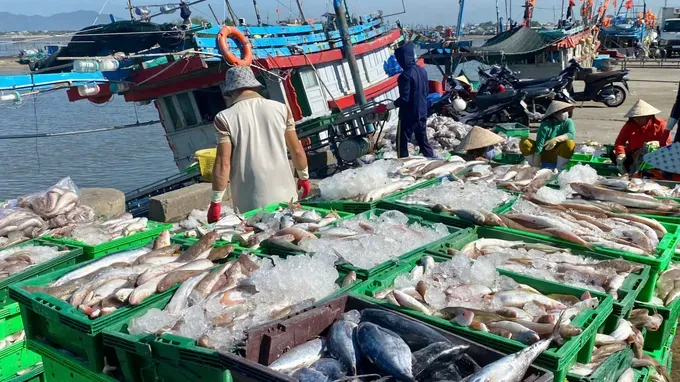
For Bui Thanh Ninh, owner of a five-vessel tuna fleet in Hoai Nhon Bac Ward of Gia Lai Province, the news came as a bolt from the blue. “We were completely taken by surprise that the US would apply regulations on protecting rare marine animals to Vietnamese fishermen”, he explained. “In practice, our fishing communities have always possessed a deep-seated consciousness for conservation. Dolphins, whales, and sea turtles are revered almost as deities; we simply don’t harm them.”
He added, with a note of weariness, “For so long, we’ve been striving to get the European Commission’s ‘yellow card’ lifted, restructuring our operations, upgrading technology, and practicing sustainable catching methods. If this new regulation is layered on top, it’s going to be incredibly difficult for us. As it is, many are already contemplating leaving the sea for shore-based work due to mounting losses and poor returns.”
This feeling of unease isn’t confined to the fishermen. In Gia Lai Province, numerous businesses involved in the purchasing and exporting of tuna are reportedly on edge over the new requirements from the National Oceanic and Atmospheric Administration (NOAA). At the bustling seafood purchasing facility run by Tran Thi Lan in Quy Nhon Ward, peak months see up to 15 tonnes of ocean tuna pass through her doors.
“The tuna fishermen in Gia Lai Province have now docked their boats for the season, preparing for the winter break,” she noted. This fallow period allows ocean tuna stocks to replenish for the next year’s harvest. “My business operations currently support around 150 laborers. If these new rules are enforced and our tuna can’t be exported, the price will plummet disastrously. It’s the workers and the fishermen who will face the harshest consequences. For ages, small traders and fishermen like us have weathered countless storms together, from the immense pressure of the yellow card regulations and fighting IUU fishing to the logistical headaches of relocating fishing ports.”
The sentiment was echoed further south. Nguyen Van Phinh, a fisherman from Cai Doi Vam Commune in Ca Mau Province, expressed his astonishment. He was reportedly unaware that as of January 1, 2026, a wide range of seafood, including tuna, swordfish, grouper, mackerel, sentinel crab, and squid, harvested using gillnets, purse seines, or single and pair trawlers could be barred from importation into the US.
“I’m a bit stunned, to be honest”, Phinh admitted. “Whenever my vessel sets sail, we meticulously report to the border patrol and ensure we comply with all standing regulations, like having vessel monitoring systems and proper fishing licenses.”
According to Head Nguyen Huu Nghia of the Gia Lai Province Fisheries Division, the impending ban will directly affect two cornerstone fishing methods for local fishermen, namely purse seining and ocean tuna line-and-pole fishing. The latter accounts for a staggering 14,000 tonnes annually, or 50 percent of the entire country’s output.
Should the US halt tuna imports, the repercussions would be severe, drastically slashing export values and jeopardizing the livelihoods of thousands of fishing households and dozens of processing enterprises. The ripple effect would undoubtedly stunt the growth of the entire fisheries sector. Losing the vast and stable-priced US market means Vietnamese businesses will be thrown into a fiercer competitive arena, vying for market share in China, Japan, the EU, and the Republic of Korea.
From a regulatory standpoint, Director Huynh Ngoc Dung of the Ly Son Marine Protected Area in Quang Ngai Province argues that the US’s position seems misaligned with Vietnam’s domestic framework. He points out that under Decree 37/2024/ND-CP, which guides the 2017 Law on Fisheries, the target species on the US’s list of 12 restricted fisheries are not classified as endangered, nor are they subject to harvesting limitations in Vietnam.
“Therefore, applying the MMPA and heeding the Vietnam Association of Seafood Exporters and Producers’ (VASEP) recommendations on specific fishing gear and target species appears to be impractical”, he stated.
“Vietnam is currently laser-focused on getting the EC’s IUU ‘yellow card’ removed. This involves stringent requirements for traceability and adherence to rules on species and permissible catch sizes. This very process is the foundation for enhancing sustainable fisheries management, ensuring legal and transparent harvesting, and ultimately protecting our aquatic resources to meet international standards. At the end of the day, these efforts are all geared towards lifting that yellow card”, Director Dung emphasized.
Former Deputy Head of the Lam Dong Province Division of Fisheries and Sea and Islands Huynh Quang Huy suggested a proactive approach. He believes Vietnam must engage in direct dialogue with US authorities to clarify the specific criteria and expectations.
“For the long haul”, he advised, “we need to conduct a top-to-bottom review of our fisheries management regulations and supplement our fleets with the necessary equipment. It’s also crucial that we communicate a simple reality to our fishermen: today’s business environment is global. If you don’t meet the world’s standards, your products won’t find a market.”
























